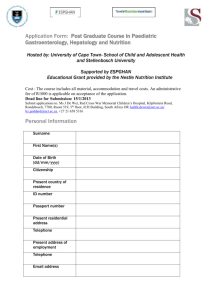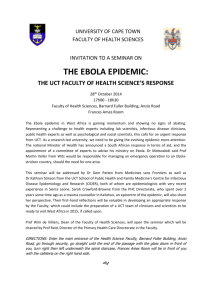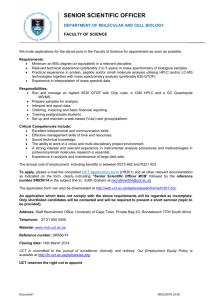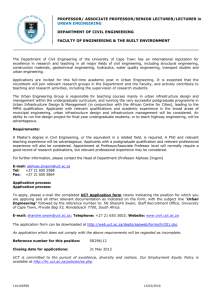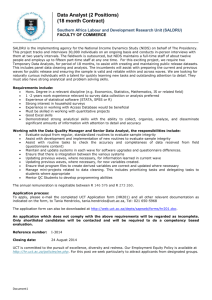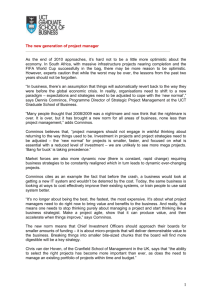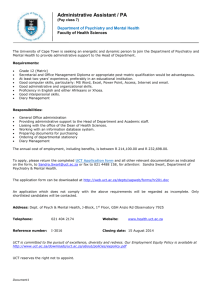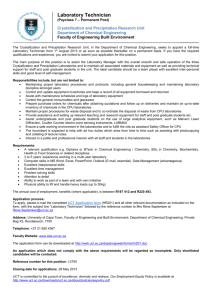UCT Post Graduate Options
advertisement
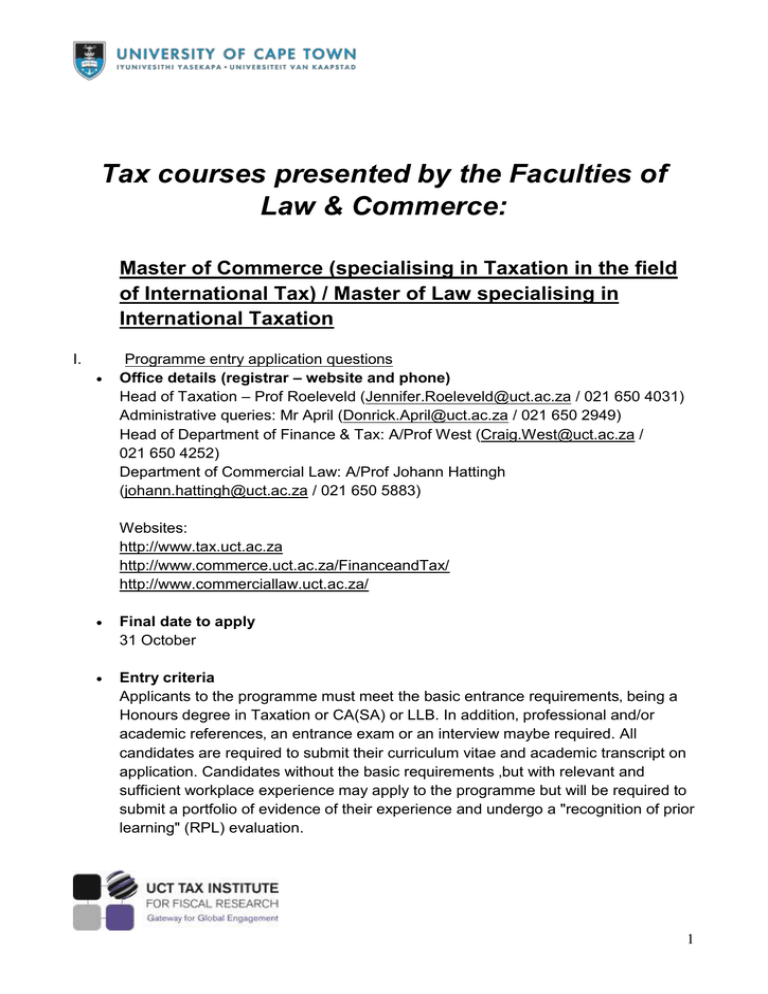
Tax courses presented by the Faculties of Law & Commerce: Master of Commerce (specialising in Taxation in the field of International Tax) / Master of Law specialising in International Taxation I. Programme entry application questions Office details (registrar – website and phone) Head of Taxation – Prof Roeleveld (Jennifer.Roeleveld@uct.ac.za / 021 650 4031) Administrative queries: Mr April (Donrick.April@uct.ac.za / 021 650 2949) Head of Department of Finance & Tax: A/Prof West (Craig.West@uct.ac.za / 021 650 4252) Department of Commercial Law: A/Prof Johann Hattingh (johann.hattingh@uct.ac.za / 021 650 5883) Websites: http://www.tax.uct.ac.za http://www.commerce.uct.ac.za/FinanceandTax/ http://www.commerciallaw.uct.ac.za/ Final date to apply 31 October Entry criteria Applicants to the programme must meet the basic entrance requirements‚ being a Honours degree in Taxation or CA(SA) or LLB. In addition‚ professional and/or academic references‚ an entrance exam or an interview maybe required. All candidates are required to submit their curriculum vitae and academic transcript on application. Candidates without the basic requirements ‚but with relevant and sufficient workplace experience may apply to the programme but will be required to submit a portfolio of evidence of their experience and undergo a "recognition of prior learning" (RPL) evaluation. 1 II. General costs FTX5034F – R24,260 FTX5033S – R24,260 FTX4036F/S – R0 FTX5032W – R17,780 OR CML5694W (+- 10% increase each year) Programme details Full-time or part time Part time Programme start date and overall duration The University of Cape Town presents Africa’s first interdisciplinary programme fully dedicated to the study of international taxation. The programme is co-presented and taught by UCT’s Faculties of Law and Commerce, in cooperation with the International Bureau of Fiscal Documentation (IBFD). Programme outline The International Tax Masters comprises a two year programme. Year 1: International Tax I The first semester commences with an intensive full-time week of lectures presented by UCT academics and visiting staff from the IBFD. The problem of double taxation and double tax conventions are introduced. Additionally, a number of topical areas may be covered (past topics included international tax transparency, the role of the BRICS in international tax policy, Base Erosion and Profit Shifting). During the remainder of the first semester, early morning and Saturday classes cover all aspects of double tax conventions. Consideration is given to the OECD, UN and SADC Model Tax Conventions, the history of the international tax system, treaty provisions dealing with business taxation, investment flows, income of individuals, non-discrimination, double tax relief, dispute resolution under tax treaties as well as more complex areas such as legal methods of treaty interpretation and key features of South Africa’s double tax treaty network, including the constitutional process for treaty making. International Tax II In the second semester, the theory and practice of transfer pricing is taught, usually by an international visiting academic. 2 Other topics covered during this semester include international tax avoidance, taxpayer information exchange, taxation and human rights and selected aspects of South Africa’s international tax regime such as provisions for relief of double taxation and controlled foreign company rules. Year 2: In the second year students perform independent research and draft a minor dissertation on an approved topic under the supervision of a programme convenor. Students are required to present an oral research proposal. If practicable, students are allowed to conduct their research away from Cape Town. Throughout the two years, students are encouraged to participate in the activities of UCT’s Tax Institute for Fiscal Research and the local activities of the International Fiscal Association. Maximum number of students permitted in course +-25 Permanent faculty Prof Jennifer Roeleveld, Assoc Prof Craig West, Assoc Prof Johann Hattingh Paper requirements to graduate You must get a simple average of 50% for the assessments in each of the courses. Note that FTX4036F/S is a non-credit bearing course and a pre-requisite for FTX5032W. Courses may not be repeated. No supplementary examinations are permitted. For the research component (FTX5032W for MCom or CML5694W for LLM)‚ you need to make satisfactory progress each year for which you are registered in accordance with a Memorandum of Understanding signed with your research supervisor. 3 Tax courses presented by the Faculty of Commerce: Bachelor of Commerce (Honours) (Taxation) I. Programme entry application questions Office details (registrar – website and phone) Course queries: Mrs Johnson (Tracy.Johnson@uct.ac.za / 021 650 4894) Administrative queries: Mr April (Donrick.April@uct.ac.za / 021 650 2949) Head of Department: Prof West Craig.West@uct.ac.za / 021 650 4252) Department Website: http://www.commerce.uct.ac.za/FinanceandTax/ Final date to apply 31 October Entry criteria Applicants to the programme must meet the basic entrance requirements‚ being a BCom or BBusSci or equivalent undergraduate degree containing taxation course(s) in the final year of that degree. In addition‚ academic references‚ an entrance exam or an interview may be required. All candidates are required to submit their curriculum vitae and academic transcript on application General costs FTX4010F – R24,260 FTX4036F/S – R0 FTX4037S – R24,260 FTX4035W – R9,780 (+- 10% increase each year) II. Programme details Full-time or part time Full-time or Part-time. The lectures / seminars are mostly Tuesday & Thursday mornings from 07:30 – 09:00. In addition‚ there ad hoc Saturday morning sessions (from 08:00 – 12:00). Programme start date and overall duration 4 The first semester course begins in February and the lectures conclude in the last week of May with the final assessment in June. The second semester course begins in July and the lectures conclude in the last week of October with the final assessment in November. Total modules, nature of the modules and total classes for each module The courses are not modulised further Maximum number of students permitted in course +- 80 Permanent faculty Mrs Tracy Johnson, Prof Jennifer Roeleveld, Assoc Prof Craig West, Assoc Prof David Warneke, Assoc Prof Francois Toerien Paper requirements to graduate Stream 1(CH001FTX11): You must get 50% or more for each course in the programme and a minimum aggregate of 50% overall. Note that FTX4036F/S does not carry a mark and is simply a pass/fail grade. Stream 2 (CH001FTX12): You must get a weighted average of 50% in FTX5030W and a simple average of 50% in the remaining courses. Note that FTX4036F/S does not carry a mark and is simply a pass/fail grade. What happens if I fail a course? Courses may not be repeated. No supplementary examinations are permitted. Provided that you score at least 40% at first attempt for FTX4035W‚ you may resubmit the technical report once. Can I get a distinction? The degree may be awarded in the First Class if you have an overall weighted average of at least 75%‚ with a subminimum of 70% in the coursework and in the technical report. 5 Master of Commerce (specialising in Taxation in the field of South African Tax) I. Programme entry application questions Office details (registrar – website and phone) Head of Taxation – Prof Roeleveld (Jennifer.Roeleveld@uct.ac.za / 021 650 4031 Administrative queries: Mr April (Donrick.April@uct.ac.za / 021 650 2949) Head of Department: Prof West Craig.West@uct.ac.za / 021 650 4252) Department Website: http://www.commerce.uct.ac.za/FinanceandTax/ Final date to apply 31 October Entry criteria Applicants to the programme must meet the basic entrance requirements‚ being a Honours degree in Taxation or CA(SA) or LLB. In addition‚ professional and/or academic references‚ an entrance exam or an interview maybe required. All candidates are required to submit their curriculum vitae and academic transcript on application. Candidates without the basic requirements‚ but with relevant and sufficient workplace experience may apply to the programme but will be required to submit a portfolio of evidence of their experience and undergo a "recognition of prior learning" (RPL) evaluation. General costs FTX5030W – R48,460 FTX4036F/S – R0 FTX5031W – R17,780 (+- 10% increase each year) II. Programme details Full-time or part time Part time Programme start date and overall duration The course begins in the last week of January and the lectures conclude midNovember. The lectures / seminars are mostly Monday and Wednesday mornings from 07:30–09:00. 6 Total modules, nature of the modules and total classes for each module A programme of approximately sixty-eight seminars‚ held twice a week for thirty-four weeks. These seminars will consist of guided group discussions of tax legislation and South African and other decisions in taxation cases heard by the courts over the years‚ aimed at developing the participant’s ability to interpret the cases and to apply the principles established in a practical manner. There will be prescribed reading for each seminar and from past experience it is estimated that students would need to devote some fifteen hours each week to this preparation. The sessions are structured so as to ensure a high degree of participation from all students. Candidates will be divided into four or five groups for the purpose of a group project (the moot courts). On three occasions during the course‚ a case study will be distributed setting out the circumstances of a dispute between a taxpayer and SARS. Each group will be required to do the necessary research and prepare Heads of Argument for both the taxpayer and SARS suitable for submission to the tax court. The intention is that candidates should develop their skills in doing research in tax legislation and judicial precedent‚ and in particular should prepare for the arguments of their opponent. The Heads will be marked by participants of the Department and the members of each group will receive the mark awarded to that group. These will form the basis for the class presentations. Maximum number of students permitted in course +-30 Permanent faculty Prof Peter Surtees, Prof Jennifer Roeleveld, Assoc Prof Craig West, Assoc Prof Deborah Tickle, Mrs Martie Foster, Mr Ulrik Strandvik, Mrs Carin Grobbelaar Paper requirements to graduate The first year is common and includes an intensive course covering South African tax cases as well as a research methods course. In the second year‚ you have the option to complete either a 90–credit minor dissertation (max of 25‚000 words) or to complete both a 60–credit minor dissertation (max 15‚000 words) and an elective course. 7 PhD in Tax I. Programme entry application questions Office details (registrar – website and phone) Head of Taxation – Prof Roeleveld (Jennifer.Roeleveld@uct.ac.za / 021 650 4031 Administrative queries: Mr April (Donrick.April@uct.ac.za / 021 650 2949) Head of Department: Prof West Craig.West@uct.ac.za / 021 650 4252) Department Website: http://www.commerce.uct.ac.za/FinanceandTax/ Final date to apply 31 October Entry criteria A suitable degree at Masters level. Acceptance onto the programme is dependent on a research proposal being approved and the availability of a supervisor. Provisional candidates will be required to present the proposal to the Departmental PhD Committee, which will decide whether the student's PhD candidacy can be confirmed. The proposal has to be presented within 6 months of first registration. General costs FTX6001W – R16,520 (+- 10% increase each year) II. Programme details Full-time or part time Part time Programme start date and overall duration Once an offer has been made you are able to register. International students need to comply with national regulations for visas etc before they are cleared for registration. Registration with the faculty office is an annual requirement. (You are also liable for fees every year.) You may register as from 2 January annually, but need not renew your registration the start of each new academic year (mid-Feb). As your access to funding and physical access to the library and labs etc are determined by your registration status, you must follow the directions (from your faculty office) for renewing your registration. The annual registration also requires the submission of a Memorandum of Understanding (MoU) which sets out the expectations of both supervisor and student for the year. It is against this that your progress is assessed annually. Unbroken registration must be maintained from the 8 first registration until graduation. If for exceptional circumstances your studies are interrupted, you may apply for leave of absence - this is at the faculty’s discretion Total modules, nature of the modules and total classes for each module A PhD thesis is required to be an original‚ coherent and consistent body of work which reflects the candidate’s own efforts. The thesis may not be more than 80‚000 words. A candidate will undertake research‚ and such advanced study as may be required, under the guidance of a supervisor or supervisors appointed by Senate. Maximum number of students permitted in course +- 5 depending on availability of supervisors Permanent faculty Prof Jennifer Roeleveld, Assoc Prof Craig West Paper requirements to graduate At the conclusion of research, the candidate shall submit a thesis for examination. This will occur after receiving an indication from the supervisor that the thesis is acceptable for submission. However, a candidate is barred from submission without the supervisor's approval. The candidate must inform the Doctoral Degrees Board Officer in writing of his/her intention. The final dates for submission of such notification for the purpose of graduation are: 10 January for persons hoping to graduate in June 20 June for persons hoping to graduate in December The dates for submission of theses are: 15 February for persons hoping to graduate in June 2016 15 August for persons hoping to graduate in December 2015 9 Tax courses presented by the Faculty of Law: Postgraduate Diploma in Law specialising in Tax Law [LG005CML10] I. Programme entry application questions Office details (registrar – website and phone) Course queries: A/Prof Trevor Emslie (emslie@law.co.za) Administrative queries: Mr Elissac (Chezlyn.elissac@uct.ac.za / 021 650 3065) Programme Convenor: A/Prof Johann Hattingh (johann.hattingh@uct.ac.za / 021 650 5883) Websites: http://www.commerciallaw.uct.ac.za/ http://www.tax.uct.ac.za http://www.sals.uct.ac.za/ Final date to apply 30 September Entry criteria A person may be considered for admission as a candidate for the Postgraduate Diploma in Law if: 1. he or she has a law degree of the University of Cape Town, or an equivalent degree of another university or institution recognised by Senate for this purpose; 2. he or she is a graduate of this University of Cape Town, or of any other university or institution recognised by Senate for this purpose, who has completed such course or courses as in the opinion of Senate on the recommendation of the Faculty of Law, qualify him/her for admission to the Diploma; 3. he or she is an enrolled advocate or attorney of the High Court of South Africa; 4. in the case of the Diploma in Tax Law, a person who has passed the final professional chartered accountancy examination of the Public Accountants and Auditors Board of South Africa, or an examination which, in the opinion of the Board and of Senate, is of equivalent standard, or a Bachelor of Commerce graduate of the University who has completed a course in taxation; 5. he or she holds any other academic or professional qualification which Senate has approved as a ground for admission to the Diploma; or 10 6. a person who has satisfied Senate, by means of such test as may be prescribed, that his/her qualifications are equivalent to any one of those enumerated in FG3.1, 3.2, 3.3, 3.4 and 3.5; 7. in the case of an applicant whose primary language is not English, he or she has submitted evidence of proficiency in English of a sufficiently high standard to undertake postgraduate studies in Law. Evidence of proficiency may include one of the following: - a recent score (obtained within 3 - 5 years before application for admission) of at least 570 (paper-based test) or 230 (computer-based test) or 88 (Internet-based test) on the Test of English as a Foreign Language (TOEFL) - a recent overall band score of 7.0 (with no individual element of the test scoring below 6.0) on the International English Language Testing System (IELTS) - a score of at least 75% on the Academic Literacy component of the National Benchmark Test (NBT). An applicant may be required to pass a law-specific English proficiency test before being permitted to register in the Faculty of Law. II. General costs CML5661W – R28,700 CML5615W – R3,610 (+- 10% increase each year) Programme details Full-time or part time Part-time. The lectures are held on Tuesday & Thursday evenings from 18h00 to 19h30. Programme start date and overall duration The first semester begins in February and the lectures conclude in the last week of May with a test and assessment due in June. The second semester begins in July and the lectures conclude in the last week of October with the final exam and assessment due in November. Total modules, nature of the modules and total classes for each module The courses are not modulised further. Maximum number of students permitted in course +- 50 11 Permanent faculty A/Prof Trevor Emslie Paper requirements to graduate CML5661W: Candidates are required to pass (a minimum result of 50%) both the following: a two-hour written test in June which counts for 30%, and one three-hour final written examination in November which counts for 70%. Further tests maybe scheduled at the discretion of the convener. CML5615W: A Postgraduate Diploma in Law student must write a research paper, or undertake written assignments of an equivalent nature, on a subject of legal interest related to the diploma course. The subject of the research paper must also satisfy the rules applicable to the particular programme. The research paper or assignments may not exceed 12 500 words. Although an original contribution to knowledge is always desirable in a research paper or assignments, it is not an essential requirement. However, candidates must show that they have: - knowledge of the subject chosen; mastered techniques required for research in law; the capacity for independent thought and sound reasoning; and satisfactorily presented the results of the research. Can I get a distinction? For the Diploma to be awarded with distinction, a candidate must: (a) submit the research paper/assignments no later than the Friday before the first term of the year following the completion of the coursework for students who have completed their coursework in December and 15 September of the same year for students who have completed their coursework in June; and (b) obtain an average mark of at least 75%, the research component counting for 50% of the examination. 12 Master of Law specialising in Tax Law (LM003CML10 / LM002CML10) I. Programme entry application questions Office details (registrar – website and phone) Course queries: A/Prof Tracy Gutuza (tracy.gutuza@uct.ac.za / 021 650 5900) Administrative queries: Mr Elissac (Chezlyn.elissac@uct.ac.za / 021 650 3065) Programme Convenor: A/Prof Johann Hattingh (johann.hattingh@uct.ac.za / 021 650 5883) Websites: http://www.commerciallaw.uct.ac.za/ http://www.tax.uct.ac.za http://www.sals.uct.ac.za/ Final date to apply 30 September Entry criteria For the Professional Masters stream as well as the Masters with course work and minor dissertation stream: A person may be considered for admission as a candidate for one of the named Professional Master of Laws degrees if 2.1 he or she has a law degree of the University of Cape Town or an equivalent degree of another University or institution recognised by the Senate for the purpose; or 2.2 he or she has in any other manner attained a level of competence, which, in the opinion of Senate, on the recommendation of the Faculty of Law, is adequate for the purposes of admission as a candidate for the degree. 2.3 in the case of an applicant whose primary language is not English, he or she has submitted evidence of proficiency in English of a sufficiently high standard to undertake postgraduate studies in Law. Evidence of proficiency may include one of the following: - a recent score (obtained within 3 - 5 years before application for admission) of at least 570 (paper-based test) or 230 (computer-based test) or 88 (Internet-based test) on the Test of English as a Foreign Language (TOEFL) - a recent overall band score of 7.0 (with no individual element of the test scoring below 6.0) on the International English Language Testing System (IELTS) 13 - a score of at least 75% on the Academic Literacy component of the National Benchmark Test (NBT). An applicant may be required to pass a law-specific English proficiency test before being permitted to register in the Faculty of Law. II. General costs CML5661W – R28,700 CML5663W – R28,700 CML5611W – R7,210 (+- 10% increase each year) Programme details Full-time or part time Part time. In the first year, the lectures take place on Tuesday & Thursday evenings from 18h00 to 19h30. During the second year, seminars are held on Wednesday evenings from 17h30 to 20h00. Programme start date and overall duration First year: The first semester begins in February and the lectures conclude in the last week of May with a test and assessment due in June. The second semester begins in July and the lectures conclude in the last week of October with the final exam and assessment due in November. Second year: The first semester begins in February and the lectures conclude in the last week of May (and an assessment is due in June for those on the Professional Masters stream). The second semester begins in July and the lectures conclude in the last week of October with the final exam in November (and an assessment due in December for those on the Professional Masters stream). Total modules, nature of the modules and total classes for each module Year 1: The objective of the course is to nurture tax lawyers and to provide non-lawyers with an insight into tax law and the rights of taxpayers in regard to liability for taxation. The accent is on the practical application of tax legislation as interpreted by the courts. The aim is to produce commercial lawyers who will be able to achieve tax efficiency when drafting agreements, negotiating contracts and advising their clients, and to foster a similar awareness of tax issues in other professionals. 14 This is a one-year course that focuses on income tax law as pronounced upon by the courts. Its compass is necessarily restricted by the amount of lecturing time available, but also - deliberately - by the content of areas of dispute within which South African jurisprudence has been developed by the courts. Tax law as an area of both practice and academic study is characterised by regular, frequent and, in recent years, substantial change. The chosen teaching method accordingly recognises that much information in the form of legislation, and the interpretation thereof by the courts, is likely to change significantly in the short term and possibly substantially in the medium to long term. The objective of the course is to impart a way of thinking about tax issues and problems; and in order to achieve this extensive use is made of court pronouncements in areas which are likely to remain fundamental to our system of taxation - despite continuous reinterpretation by the courts and a shifting legislative context. Students who engage actively in this process obtain thereby a principled foundation and grasp that equips them to master the inevitable changes that characterise this branch of the law. This is an ability that is required of all tax professionals, whether academic or in practice, and the aim of this course is to foster and nurture the necessary skills. The emphasis of the course is accordingly on knowledge rather than information, knowledge that will stand the test of time and enable graduates to integrate future tax changes into their methodology of resolving difficult tax problems in accordance with South African tax jurisprudence. Year 2: The course deals with Value added Tax, Donations tax and Estate Duty tax as levied in South Africa. The relevant legislation as interpreted by the courts, its practical application, both domestically and internationally will be examined. The course also deals with international taxation, in overview. The course will cover, inter alia, trading into and out of South Africa, methods of relieving international double taxation, the interpretation and application of double taxation conventions, the Organisation for Economic Co-operation and Development's (OECD) Model Convention on Income and on Capital, the United Nations Model Convention on Income and on Capital, the allocation of taxing liability of various forms of income, international tax avoidance including transfer pricing and thin capitalisation and exchange control. 15 During year 2, candidates are required to present papers, disseminated in advance to the class as a whole, on approved topics. Active participation is required in all seminars at which papers are presented. The number of papers to be presented will depend on the size of the class but will not be less than two. Maximum number of students permitted in course +-15 Permanent faculty A/Prof Trevor Emslie (year 1), A/Prof Tracy Gutuza (year 2), Prof Dennis Davis (Year 2) Paper requirements to graduate CML5661W (year 1): Candidates are required to pass (a minimum result of 50%) both the following: a two-hour written test in June which counts for 30%, and one three-hour final written examination in November which counts for 70%. Further tests maybe scheduled at the discretion of the convener. CML5663W (year 2): Satisfactory attendance and presentation of seminar papers required. The papers presented by the candidates, which are to be written up following criticism and comment during the presentation, will count for 50% and a further four hour examination counts for the remaining 50%. Both the papers and the examination must be passed. CML5611W (year 2): A Master of Laws (LLM) student must write a minor dissertation (or complete the required number of research tasks for the professional masters stream) on a subject of legal interest related to one of their courses. The subject of the dissertation must also satisfy the rules applicable to the particular programme. The minor dissertation (or research tasks) may not exceed 25 000 words in length. Although an original contribution to knowledge is always desirable, it is not an essential requirement. However, candidates must show that they have: o o o o a thorough knowledge of the subject chosen; mastered techniques required for competent research in law; the capacity for independent thought and sound reasoning; and satisfactorily presented the results of the research. 16 Can I get a distinction? For the Professional Masters stream, to be awarded with distinction, a candidate must: a. b. c d. complete the coursework in one year if full-time or in two years if part-time; submit the research tasks as per rule FPM3.8; not count work towards the degree in respect of work that he or she has completed towards another degree or diploma; and obtain an average mark of at least 75%. For the Masters in approved courses and minor dissertation, to be awarded with distinction, a candidate must: a. complete the coursework in one year if full-time or in two years if part-time; b. submit the minor dissertation no later than the Friday before the first term of the year following the completion of the coursework for students who have completed their coursework in December and 15 September of the same year for students who have completed their coursework in June; c. not be permitted to count work for which he or she may have been granted credit towards the degree in respect of work completed towards another degree or diploma; and d. obtain an average mark of at least 75%, the minor dissertation counting for 50% of the examination. 17 PhD in Commercial Law I. Programme entry application questions Office details (registrar – website and phone) Course queries: A/Prof Johann Hattingh (johann.hattingh@uct.ac.za / 021 650 5883), A/Prof Tracy Gutuza (tracy.gutuza@uct.ac.za / 021 650 5900) Administrative queries: Mr Elissac (Chezlyn.elissac@uct.ac.za / 021 650 3065) http://www.commerciallaw.uct.ac.za/ http://www.tax.uct.ac.za http://www.sals.uct.ac.za/ Final date to apply At any date. Note that a PhD introductory week in February is compulsory. Entry criteria A suitable degree at Masters level. Acceptance onto the programme is dependent on a research proposal being approved and the availability of a supervisor. Provisional candidates will be required to present the proposal to the Departmental PhD Committee, which will decide whether the student's PhD candidacy can be confirmed. The proposal has to be presented within 6 months of first registration. General costs CML6700W – R16,520 (+- 10% increase each year) II. Programme details Full-time or part time Part time. Programme start date and overall duration Applicants are provisionally registered for a six month period, during which time they must produce a comprehensive research proposal under supervision. The research proposal will be considered by the Faculty’s organs after which an offer may be made to register for the PhD degree. International students need to comply with national regulations for visas etc before they are cleared for registration. Registration with the faculty office is an annual requirement. (You are also liable for fees every year.) You may register as from 2 January annually, but need not renew your registration the start of each new 18 academic year (mid-Feb). As your access to funding and physical access to the library and labs etc are determined by your registration status, you must follow the directions (from your faculty office) for renewing your registration. The annual registration also requires the submission of a Memorandum of Understanding (MoU) which sets out the expectations of both supervisor and student for the year. It is against the background of the MoU that your progress is assessed annually. Unbroken registration must be maintained from the first registration until graduation. If for exceptional circumstances your studies are interrupted, you may apply for leave of absence - this is at the Faculty’s discretion. Total modules, nature of the modules and total classes for each module The Faculty of Law offers a Doctor of Philosophy (PhD) degree which is examined by a thesis. The degree may be conferred in a specialist area such as commercial law, which covers tax law. A PhD thesis is required to be an original‚ coherent and consistent body of work which reflects the candidate’s own efforts. The thesis may not be more than 80‚000 words. A candidate will undertake research‚ and such advanced study as may be required, under the guidance of a supervisor or supervisors appointed by Senate. Maximum number of students permitted in course Depends on availability of supervisors. Permanent faculty Assoc Prof Johann Hattingh, Assoc Prof Tracy Gutuza Paper requirements to graduate At the conclusion of research, the candidate shall submit a thesis for examination. This will occur after receiving an indication from the supervisor that the thesis is acceptable for submission. However, a candidate is barred from submission without the supervisor's approval. The candidate must inform the Doctoral Degrees Board Officer in writing of his/her intention. The final dates for submission of such notification for the purpose of graduation are: 10 January for persons hoping to graduate in June 21 June for persons hoping to graduate in December The dates for submission of theses are: 15 February for persons hoping to graduate in June 2016 15 August for persons hoping to graduate in December 2015. 19 20
